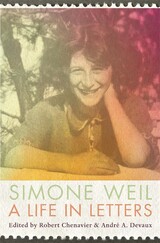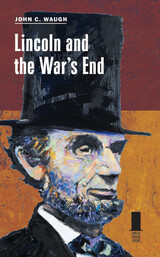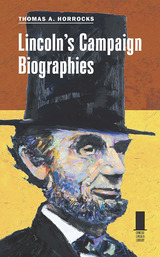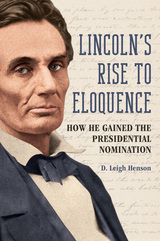19 start with F start with F
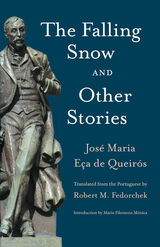
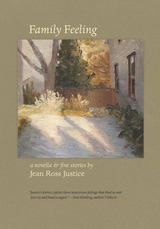
Many of the stories revolve around end-of-life scenes. An elderly man is visited by his middle-aged son’s young second wife and child, whom the son has temporarily abandoned in order to tend to his dying ex-wife. A recently widowed woman faces a complicated relationship with a troubled home health-care worker who had been uncommonly kind to her dying husband. Four middle-aged siblings reconvene in their childhood home to attend to the death of their father and find themselves simultaneously children of, and parents to, their own parents.
The unobtrusive historical breadth of the stories is remarkable. Reflecting back to Depression-era southern America from the perspective of the early twenty-first century, the characters provide us with an intimate view of the changing cultural landscape of our country. Issues of class are not merely ideological here—they are fluid and intricate aspects of fate and of soul.
Justice’s prose is characterized by quiet humor and attention to gesture. The deeply self-reflective and self-contained narrators offer us a window into issues of aging and mortality that is real and rare. In the manner of Alice Munro or William Trevor, Jean Ross Justice’s thought-driven fiction centers on pivotal moments of action or conversation that haunt—or reverberate—for decades.
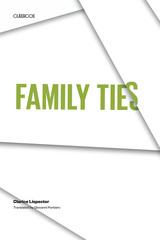
The silent rage that seizes a matriarch whose family is feting her eighty-ninth year.The tangle of emotions felt by a sophisticated young woman toward her elderly mother. An adolescent girl's obsessive fear of being looked at. The "giddying sense of compassion" that a blind man introduces into a young housewife's settled existence. Of such is made the world of Clarice Lispector, the Brazilian writer whose finest work is acknowledged to be her exquisitely crafted short stories. Here, in these thirteen of Lispector's most brilliantly conceived stories, mysterious and unexpected moments of crisis propel characters to self-discovery or keenly felt intuitions about the human condition. Her characters mirror states of mind. Alienated by their unsettling sense of life's absurdity, they seem at times absorbed in their interior lives and in the passions that dominate and usually defeat them.
Giovanni Pontiero's translation has been lauded by Gregory Rabassa as "magnificent."
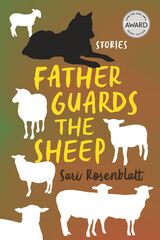
In Sari Rosenblatt’s collection, by turns tender and hilarious, we see fathers who are bullies and nervous watchdogs, haunted by their own pasts and fear of the future they may never see. And who do their daughters become? A substitute teacher who encounters mouthy students who believe she’s not real. Another lands a job on her city’s arson squad, researching derelict properties their owners might want to burn. A beleaguered mother, humiliated by the PTA’s queen bee, finds solace in an ancient piece of caramel candy. “I keep sucking,” she says, “until some flavor, no longer caramel, comes out.” In the end, this is what all these finely wrought characters want: to wring sweetness from what’s been passed down to them.
Rosenblatt’s comic sensibility, so present in these stories, entertains and consoles, while seeming to say to her readers: you might as well laugh.

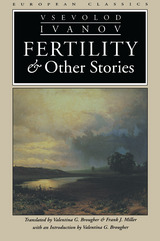

Fidelities is the first collection of eighteen short stories to be published by this multi-faceted author. The stories in Fidelities, which are mostly set in West Virginia, are both heartrending and beautiful. Nieman published her first novel, Neena Gathering, a post-apocalyptic science fiction novel, in 1988. She has also published two poetry chapbooks, Slipping out of Old Eve and How We Live. Her second fictional work, Survivors, was published in 2000.
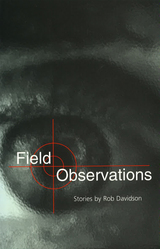
Field Observations, the debut fiction collection from Rob Davidson, contains stories about people who find themselves at difficult turning points in their lives—times when they are faced with hard choices, broken promises, and the fear of self-destruction. Davidson's characters are diverse: a retired math teacher, an auto repair worker, a technical writer, a nurse living overseas. What connects them is the way Davidson renders each character with essential human dignity, regardless of his or her flaws. This collection addresses such contemporary concerns as love relationships, cultural interaction, divorce, aging, and alcoholism in a lively, sometimes offbeat way.
In "Inventory"—winner of a 1997 AWP Intro Journals Award—the young narrator, fresh out of the army, struggles to take stock of his civilian life and assume responsibility for himself. An estranged wife, in "You Have to Say Something," competes for attention with her husband's manic approach to work, finding both solace and frustration in a new friend, a compulsive gift-giver. "A Private Life" renders a young Peace Corps volunteer grappling with her loneliness in a foreign country, with a sense of exposure and violation. In "What We Leave Behind," a college dropout and onetime golf prodigy finds himself dissatisfied with his current career as a vacuum cleaner salesman; after a quirky encounter with a client, he finds hope for a new beginning.
A recurrent motif in the stories is the presentation of characters who either tend to observe, even spy on, others, or who have the sense that they themselves are being watched. The notion of a passive observer extends to several characters who seem to treat their own lives as subject for observation rather than action, frequently persisting in patterns of behavior that are clearly destructive.
Rendered in clean, smooth prose with sharply observed details and driven by Davidson's fine ear for dialogue, these stories poignantly capture the difficult in-between states that trouble people every day. Fully defined and evocatively written, this collection addresses important real-life issues and concerns.
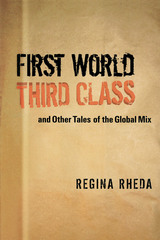
Regina Rheda is a contemporary award-winning Brazilian writer whose original voice and style have won her many admirers. First World Third Class and Other Tales of the Global Mix presents some of her finest and most representative work to an English-speaking readership. Stories from the Copan Building consists of eight tales set in a famous residential building in São Paulo. The stories, like the apartment complex, are a microcosm of modern-day urban Brazil. They are witty, consistently caustic, and never predictable.
Also in this volume is the poignant and often hilarious novel First World Third Class. It depicts young middle-class professionals and artists who, as opportunities in Brazil diminished, opted to leave their country, even if it meant taking menial jobs abroad. At the center of the narrative is Rita, a thirty-year-old aspiring filmmaker who migrates to England, and then Italy. She looks for work and love in all the wrong places, moving from city to city and from bed to bed.
The last three stories in this collection also happen to be among the author's most recent. "The Enchanted Princess" is an ironic title for a postfeminist tale of a South American woman being wooed to marry an old-world gentleman who promises to take care of her every need. "The Sanctuary" concerns the living conditions of immigrant workers and farm animals. Equally piquant in nature, "The Front" deals with ecology, labor environments, and gender politics.


For You, I’d Steal a Goat is a vibrant collection of short stories filled with memorable characters, intriguing plots, and twist endings. It explores a wide range of themes, such as corruption, racial bias, family troubles, and lovers’ spats, to name a few. In his stories about queer relationships, Niq Mhlongo surfaces the complexities of a community whose narratives have been silenced. With his keen observations and insights into human nature, Mhlongo explores the things that people do for each other, but also to each other, including acts of injustice and exploitation as well as of love and desire. Mhlongo’s stories are critical, erudite, and masterfully crafted using satire and careful deliberation to connect to the quotidian lived experiences of readers. With a sense of humor, Mhlongo reflects on some of the greatest transformations South Africans have faced in recent times and engages with crucial matters in the present.
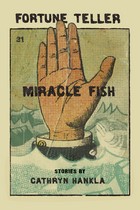
A mentally challenged teen in a coma, a WWII veteran weighing his beliefs, an intersexed man anticipating a relationship, a single woman who has kissed far too many frogs, and a first grader suffering at the hands of a family friend. These are just a few of the unforgettable characters in Fortune Teller Miracle Fish, an innovative collection of stories from award-winning novelist and poet Cathryn Hankla. The figures in these stories struggle toward more truthful expressions of themselves, as outsiders whose dilemmas, emotions, and desires make them unmistakably human. As varied as they are vivid, they strive for closer connections of love and community. Through humor and understanding, Hankla intrepidly navigates the transitions that define them—unplanned pregnancy, divorce, death, and gender change, to name a few. Acutely attuned to her subjects’ inner landscapes, Hankla captures the full spectrum of human experience, from childhood to old age, with heart, rare skill, and nerve.
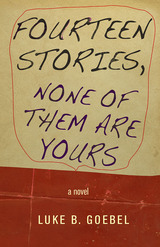

Over the course of his life, Frank Waters amassed a body of work that has few equals in the literature of the American West. Because his was a writing that touched every facet of the Western experience, his voice still echoes throughout that region’s literary world.
Swallow Press is especially proud to present this generous sampling of Frank Waters’s writings. A Frank Waters Reader encompasses the full range of his work and draws from both his nonfiction and his many novels. It stands as a testament to his singular achievement and proof of the talent that established him as the foremost writer in the Southwest.
This collection spanning forty years of writing provides an excellent introduction for the uninitiated as well as a retrospective for those already familiar with this giant talent. His gift for achieving a delicate balance among the many contrary forces at work in the land and the people who inhabit it is as true and enduring as the region that inspired him.

Over the course of his life, Frank Waters amassed a body of work that has few equals in the literature of the American West. Because his was a writing that touched every facet of the Western experience, his voice still echoes throughout that region’s literary world.
Swallow Press is especially proud to present this generous sampling of Frank Waters’s writings. A Frank Waters Reader encompasses the full range of his work and draws from both his nonfiction and his many novels. It stands as a testament to his singular achievement and proof of the talent that established him as the foremost writer in the Southwest.
This collection spanning forty years of writing provides an excellent introduction for the uninitiated as well as a retrospective for those already familiar with this giant talent. His gift for achieving a delicate balance among the many contrary forces at work in the land and the people who inhabit it is as true and enduring as the region that inspired him.

There’s the comic: “Tinsel. No one needs tinsel. Even the word is a tinselly kind of word.” There’s the sentimental: “Her hair was the same thin shade of gray as the weather-beaten pickets of the fence around her frozen garden.” There’s the reminiscent: “Christmas was books, and books Christmas, in those days now mostly washed down to the cold sea.” Along the way, there’s the theological, the learned, the mystical, and the musical.
“Tastefulness is just small-mindedness pretending to be art,” he writes in praise of mad and cluttered holidays. “Christmas will not be defined by our failures to apply its lessons and carols,” he explains about Yuletide poetry. To see these essays and short stories gathered in one place—in a beautiful illustrated edition from St. Augustine’s Press—is to see the whole of the vision that Joseph Bottum has been painting for decades: a picture of Christmas as a thin place in the wall between the natural and the numinous, where a burning grace slips into a cold winter world.



This fine debut of twelve stories explores a topography of the interior, probing the thoughts, motivations, and little-understood impulses behind moments of aggression, jealousy, and loneliness. Turning her eye on the academic landscape as well as the workaday world, Frucht keenly observes people forging friendships, groping for greater self-understanding, and attempting to find meaning in their lives and loves.
Whether writing about a couple trying to conceive a much-wanted child or a lonely husband mourning the changing political attitudes of his wife, Frucht brings her characters and their lives into memorable focus. She builds a fictional world that resonates with the immediate and the familiar.
Although many books of contemporary fiction document the ways people often fail to communicate, the essential quality of Abby Frucht's characters is that they do communicate—connect—and gain part of what they want from life as a result. These stories are never about despair without also being about hope. They speak to each other as playfully and accidentally as memories do.
READERS
Browse our collection.
PUBLISHERS
See BiblioVault's publisher services.
STUDENT SERVICES
Files for college accessibility offices.
UChicago Accessibility Resources
home | accessibility | search | about | contact us
BiblioVault ® 2001 - 2024
The University of Chicago Press


